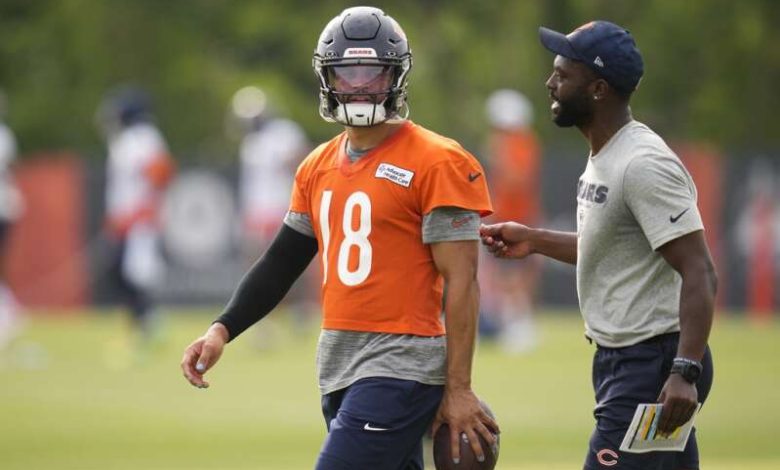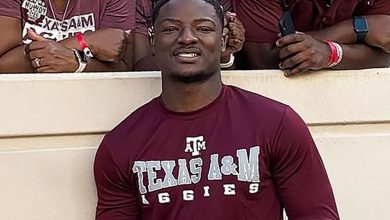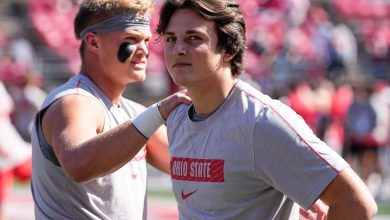Caleb Williams operated more smoothly at the line of scrimmage Friday, but overall, the Bears’ offense struggled again, highlighting ongoing issues despite some improved communication and decision-making from the rookie quarterback.

The journey of a young quarterback in the NFL is often marked by flashes of promise intertwined with persistent challenges. For Caleb Williams, the rookie quarterback of the Chicago Bears, recent practices and games have been a microcosm of this reality. On Friday, Williams demonstrated notable improvement in how he operated at the line of scrimmage, suggesting growth in his understanding, communication, and decision-making. However, despite this positive development, the Bears’ offense as a whole continued to struggle, revealing that there is still a significant gap between improved communication and consistent offensive production.
This comprehensive analysis explores the significance of Williams’s improved operation at the line of scrimmage, examines the ongoing issues plaguing the Bears’ offense, and discusses what these developments mean for the team’s future.
The Significance of Operating Smoothly at the Line of Scrimmage
In football, the line of scrimmage is the battlefield where the game’s tactical chess match unfolds. For a quarterback, especially a rookie like Williams, effectively operating at this point involves more than just calling plays—it encompasses identifying defensive alignments, making pre-snap adjustments, communicating with teammates, and making quick, accurate decisions.
Why is this aspect crucial?
A quarterback who can read the defense effectively before the snap gains a strategic edge. It allows for adjustments that can exploit defensive weaknesses, avoid costly penalties, and set the offense up for success. Improved operation at the line of scrimmage often translates into better rhythm, fewer mistakes, and increased confidence—elements that are vital for a young signal-caller.
Williams’s progress in this area indicates that he is becoming more comfortable with the complexities of NFL defenses. His ability to recognize coverages, adjust protections, and relay signals to his teammates reflects growth in both football IQ and leadership. This is a promising sign, especially given the challenges faced by many rookie quarterbacks in mastering these skills early in their careers.
The Specifics of Williams’s Improved Performance
On Friday, reports and observations from practice indicated that Caleb Williams was more decisive and clear in his communication. He was seen adjusting protections at the line more confidently, pointing out defensive shifts, and changing plays when necessary. This suggests a maturing understanding of the game plan and a developing rapport with his offensive line and skill position players.
Key aspects of his improved operation included:
- Pre-snap reads: Williams demonstrated better recognition of defensive formations, allowing him to choose appropriate plays or adjustments.
- Protection calls: He communicated effectively with offensive linemen to ensure proper protection schemes, reducing the likelihood of sacks or pressure-induced mistakes.
- Play adjustments: Williams was more comfortable changing plays at the line based on defensive alignments, indicating an increased understanding of situational football.
Such improvements can be attributed to dedicated film study, coaching emphasis, and experience gained during practices and game situations. It also signals that Williams is developing into a more autonomous quarterback, capable of handling the mental demands of NFL defenses.
The Broader Context: Why Improving at the Line Matters
While operational improvements are promising, they alone do not guarantee offensive success. Football is a complex sport where execution, scheme, and personnel all play critical roles. The Bears’ overall offensive struggles suggest that, despite Williams’s growth, other elements remain inconsistent.
Operational mastery at the line of scrimmage sets the foundation for offensive success, but it must be complemented by:
- Effective blocking schemes: The offensive line must protect the quarterback and create running lanes.
- Reliable skill players: Receivers need to get open and catch contested throws.
- Consistent execution: The entire unit must perform their roles with precision.
When these elements falter, even a well-operating quarterback can find himself in difficult situations.
The Persistent Troubles of the Bears Offense
Despite Williams’s progress, the Bears’ offense continues to face multiple challenges:
- Inconsistent Protection:
The offensive line has struggled with pass protection, giving up pressure and sacks that disrupt rhythm and limit playcalling options. Even with improved communication from Williams, if the line cannot hold up, the offense remains vulnerable. - Lack of Explosive Plays:
The Bears have yet to establish a consistent deep threat or explosive offensive plays. This stagnates drives and limits scoring opportunities. - Ineffective Run Game:
A balanced offense is crucial, and the Bears’ rushing attack has been inconsistent. Without a threat on the ground, defenses can focus more on stopping the pass, further pressuring Williams. - Limited Receiving Options:
The receiver corps has struggled to create separation and make contested catches, reducing the reliability of passing options. - Penalties and Mental Errors:
The offense has been plagued by penalties—false starts, illegal formations—and mental errors that stall drives and extend opponents’ possessions. - Poor Third-Down Efficiency:
Converting third downs has been a challenge, often leading to punting or turnovers.
These issues collectively hinder the development of a cohesive, high-powered offense. Improving at the line of scrimmage is a positive step but must be part of a broader improvement across all facets of the unit.
The Impact of Improved Line Operation on Future Performance
Caleb Williams’s progress in this area is a promising indicator for the future. It suggests that he is beginning to internalize NFL-level decision-making processes, which is critical for sustained success.
Potential benefits include:
- Fewer turnovers: Better pre-snap reads and adjustments reduce the risk of miscommunications leading to interceptions or sacks.
- Increased confidence: As Williams becomes more autonomous, he can focus more on executing plays rather than second-guessing or overthinking.
- More efficient drives: Improved communication allows the offense to operate more smoothly, sustaining longer drives and controlling possession.
However, these benefits depend heavily on the supporting cast and scheme. If protection remains inconsistent or receivers cannot capitalize on opportunities, the offense’s overall productivity will remain limited.
The Psychological and Leadership Aspects
For a rookie quarterback, operating smoothly at the line of scrimmage also speaks to confidence and leadership. When Williams confidently communicates, makes adjustments, and exudes command, it can have a ripple effect on the entire offense.
Building trust with teammates is essential. As Williams shows growth in this area, it encourages linemen, receivers, and running backs to buy into his leadership, potentially leading to better execution and resilience.
Mental toughness is equally important. Overcoming the frustrations of early struggles and focusing on incremental improvements can help Williams develop into a more effective leader.
Moving Forward: What the Bears and Caleb Williams Need
While the recent improvement at the line of scrimmage is encouraging, the Bears must address the broader issues to fully capitalize on Williams’s potential. This includes:
- Enhancing offensive line talent and scheme: Investing in protection and developing schemes that mitigate pass rushes.
- Improving skill position play: Developing receivers’ route-running and catching consistency.
- Establishing a balanced attack: Incorporating a more effective run game to keep defenses honest.
- Reducing penalties and mental mistakes: Focusing on discipline and situational awareness.
- Supporting Williams’s growth: Providing coaching and feedback that continue to refine his decision-making and leadership.
For Caleb Williams, the focus should remain on continued development, staying calm under pressure, and building chemistry with his teammates. The progress at the line of scrimmage signals that he is on the right path, but the journey toward becoming an NFL franchise quarterback requires patience, perseverance, and sustained effort.
The recent practice session on Friday, where Caleb Williams demonstrated more fluid and confident operation at the line of scrimmage, offers a silver lining amid ongoing offensive struggles. It indicates that he is absorbing lessons, gaining confidence, and developing into a more autonomous quarterback capable of managing complex defenses.
However, football is a team sport. The Bears’ offensive issues—protection breakdowns, lack of explosive plays, inconsistent running game, and mental mistakes—continue to hinder progress. Improving at the line of scrimmage is a vital step, but it must be complemented by improvements across all units.
For the future, Williams’s growth in communication and decision-making is a promising sign that, with time and support, he can elevate the Bears’ offense. Patience and holistic development are key, and while the journey remains challenging, each step forward, like the one taken on Friday, brings the team closer to realizing its offensive potential.









